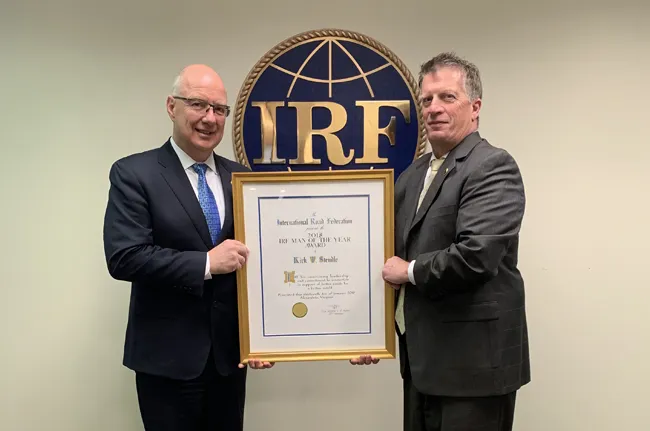Republican Congressman Bill Shuster has told a gathering of public and private sector leaders that improving and maintaining the American transport system is critical to staying globally competitive, and that a broad education process is needed to improve awareness of infrastructure needs.
Shuster, chairman of the U.S. House Transportation & Infrastructure Committee, was the keynote speaker at the 26 August 2013 annual meeting of Build Up Greater Cleveland (BUGC), a Northeast Ohio coalition of agencies i
August 29, 2013
Read time: 2 mins
Republican Congressman Bill Shuster has told a gathering of public and private sector leaders that improving and maintaining the American transport system is critical to staying globally competitive, and that a broad education process is needed to improve awareness of infrastructure needs.
Shuster, chairman of the U.S. House Transportation & Infrastructure Committee, was the keynote speaker at the 26 August 2013 annual meeting of Build Up Greater Cleveland (BUGC), a Northeast Ohio coalition of agencies involved in infrastructure issues. Representatives from the Great Lakes Metropolitan Chambers of Commerce also attended the meeting.
“Without safe and efficient transportation, we can’t be competitive,” said Shuster. “We philosophically are connected by freedom and family, but we are physically connected by the transportation system. We need to do it smarter and we need to maintain it.”
Shuster said the Transportation & Infrastructure Committee is planning to consider the WRRDA bill (Water Resources Reform and Development Act) when Congress returns in September. The bill is intended to strengthen water transportation networks and processes.
“This is a jobs bill,” he added. ”We believe it’s about competitiveness, economic growth and trade, which equates to jobs.”
Shuster said that he is cautiously optimistic that Congress will pass the bill, but added that it will require an education effort. Nearly half of the current members of Congress were not in their House seats in 2007, the last time the bill was passed.
And he said there needs to be a broader awareness effort across the nation so that the public and its leaders understand the investments that are needed to improve U.S. infrastructure assets.
Later this year and into next year, the Committee will review bills dealing with rail and highways.
Shuster recognized the Great Lakes region as an economic powerhouse that is a prime driver of the U.S. economy. It has 20% of the world’s fresh water, makes 30% of U.S. merchandise exports and provides 40% of U.S. manufacturing employment.
GCP president and CEO Joe Roman said, “We very much appreciate Chairman Shuster coming to Cleveland and listening to our concerns. Infrastructure needs are crucial and can be costly, and they are essential for the economic vitality for regions across the nation.”
Shuster, chairman of the U.S. House Transportation & Infrastructure Committee, was the keynote speaker at the 26 August 2013 annual meeting of Build Up Greater Cleveland (BUGC), a Northeast Ohio coalition of agencies involved in infrastructure issues. Representatives from the Great Lakes Metropolitan Chambers of Commerce also attended the meeting.
“Without safe and efficient transportation, we can’t be competitive,” said Shuster. “We philosophically are connected by freedom and family, but we are physically connected by the transportation system. We need to do it smarter and we need to maintain it.”
Shuster said the Transportation & Infrastructure Committee is planning to consider the WRRDA bill (Water Resources Reform and Development Act) when Congress returns in September. The bill is intended to strengthen water transportation networks and processes.
“This is a jobs bill,” he added. ”We believe it’s about competitiveness, economic growth and trade, which equates to jobs.”
Shuster said that he is cautiously optimistic that Congress will pass the bill, but added that it will require an education effort. Nearly half of the current members of Congress were not in their House seats in 2007, the last time the bill was passed.
And he said there needs to be a broader awareness effort across the nation so that the public and its leaders understand the investments that are needed to improve U.S. infrastructure assets.
Later this year and into next year, the Committee will review bills dealing with rail and highways.
Shuster recognized the Great Lakes region as an economic powerhouse that is a prime driver of the U.S. economy. It has 20% of the world’s fresh water, makes 30% of U.S. merchandise exports and provides 40% of U.S. manufacturing employment.
GCP president and CEO Joe Roman said, “We very much appreciate Chairman Shuster coming to Cleveland and listening to our concerns. Infrastructure needs are crucial and can be costly, and they are essential for the economic vitality for regions across the nation.”






